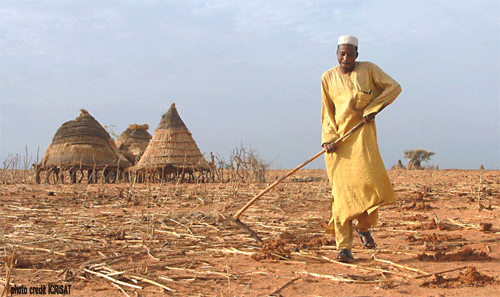|
||||
DMP Coordinator Spreads Message in JapanDr. Saidou Koala, Global Coordinator of the DMP gave a presentation to Nagoya University, Japan's Open Seminar Series on Nov. 9, 2005 entitled 'Impacts of soil fertility management on food security in the Sahel'. He explained the enormous potential for boosting yields through the innovative microdosing and warrantage systems. Here is a brief summary. The Sahel of West Africa continues to be food-insecure as evidenced by the 2005 famine in the dryer areas of Niger, Mali and Burkina Faso. In Niger, about 2.5 million people, almost a quarter of the population, needed food aid in 2005, according to the World Food Program. Recurrent droughts are common occurrences in the region and are
thought to cause these food shortages for both humans and the
livestock they depend on. However, the Sahelian famine has it roots
in long-term structural problems, poor farm households with limited
financial assets to make them resilient to shocks like drought. Soils are inherently poor, particularly deficient in major nutrients such as nitrogen and phosphorus and rainfall is low and erratic throughout the region. As human population increases, so does the number of livestock, and cropped area expands into ever more marginal lands. This places increasing stress on the natural resource base, degrading soils and biodiversity. To meet the increasing food needs of the population in the region, there is a need to intensify agriculture, thereby increasing productivity on the existing land. Research by ICRISAT and its partners including JIRCAS in Niger is creating new hope in the Sahel. Better natural resource management technologies including fertilizer applied to crops in small quantities or "micro-doses" and hill placed combined with the use of crop residues and/or manure enhances fertilizer use efficiency, increases productivity and reduces quantity and costs of inputs. The combination of this technology with complementary institutional and market linkage is leading to a significant technology breakthrough in the Sahel.
Return to On the Edge table of contents
|
||||
|

